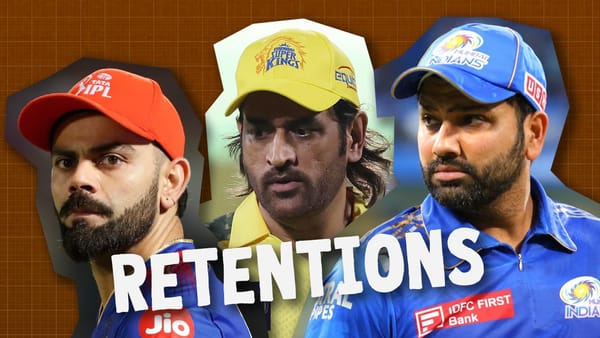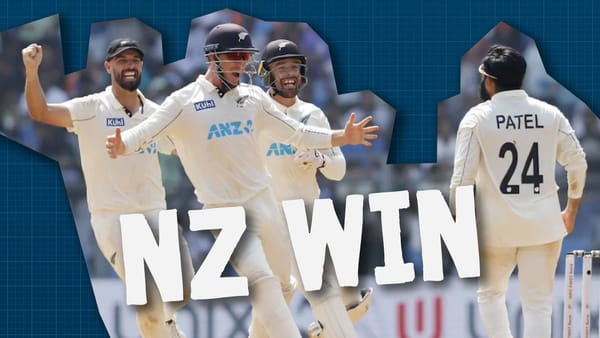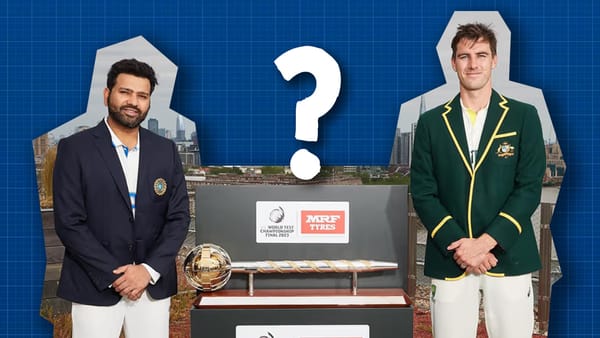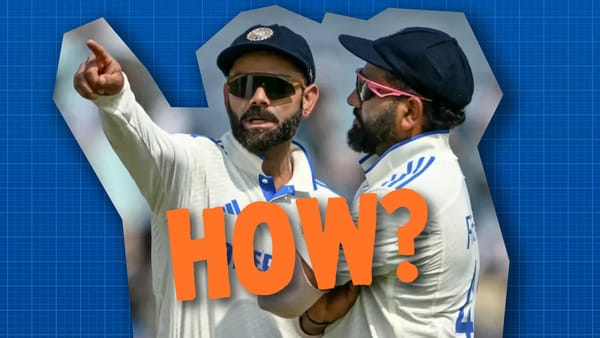The content of Virat Kohli's captaincy
Looking at how hard it is to judge captains.
This content is not really about Virat Kohli and the quality of his captaincy. And the reason for that is that leadership is almost impossible to talk about.
Let's bring it back to basics, captains choose batting orders. Test lineups are pretty much set in stone unless a huge disaster comes out or someone is stuck on the toilet. And in modern cricket, coaches probably have as much - if not even more - say in who bats where.
There is the toss, which can be huge, but in truth, the most important thing about the toss is usually winning it. You can make mistakes at the coin flip, but losing it and letting the other captain make the decision can also end in errors. The truth is what to do at the toss is mostly obvious. In the rare occasions where it isn't, there is luck involved, and we tend to view by results, which often isn't fair.
What about bowling changes? You choose whoever is not tired in a four-person attack mostly. Even the so-called inspired changes because of a good matchup are often discussed by the team beforehand. The 'golden arm' part-timers are applauded when they come off, but they usually come from desperation or conditions.
It gets a bit more tactical in a five-person attack, and Kohli certainly had access to that. But he's still just looking at rotating bowlers most of the time. We focus on the tactics a lot, but the conditions and match situation usually plays a big part in who bowls next. The second new ball, some reverse, or a bunch of left-handers at the crease will dictate much more who he uses than special captaincy spidey senses.
What about fielding positions? I hear your drunk uncle ask. Well I did a video on that a while ago.
Let's talk about third slip and how using it in a long-format game is always a trade-off
— ESPNcricinfo (@ESPNcricinfo) 2:45 PM ∙ Apr 22, 2020
#GoodAreas | @ajarrodkimber
Let's say a catch goes to where third slip was, the simplest thing is to say that a third slip would have caught it. But that third slip is from a set of nine people. In order for the bowler to have built up the pressure to get that edge, you may have needed the player in the ring or on the boundary to create it.
Think about this, a batter will know if you put a bunch of leg-side riders out you're about to bump them. However, the best bouncer is often a surprise. So if you shock them and they hook with only the fine leg out, they may not be caught. But if you're watching at home, you will think, why didn't they have someone out?
One of cricket's oddest things is that we have tracked where players have hit the ball for over 100 years, but not where the fielders stand. Meaning we have beautiful wagon wheels that show where the fielders weren't. When it comes to the field, we have no real idea.
Yet we all watch a lot of cricket. I'd guess we have three main types of captains for fields. Funky captains who at least make it look like they are trying to do something. Conservative leaders who will protect runs over chasing wickets. And ball chasing skippers who place someone where the ball was just hit.
The thing is, most captains are a mix of all three. If Virat was leaning towards one the most, it's ball chasing.
Ball chasing captains work when you are playing against a struggling batter. "Oh, he has nicked that, better put in another slip". But ball chasing captains don't work when you're going up against a batter who is on top. "He pumped that through cover; I better lock that up. Oh, now he hit the ball through square leg, and that is where I put that man at cover; I better move someone else."
But everything I just said is subjective because we don't measure this. I can't tell you which theory is better than the other. I can't even with great certainty tell you that Kohli is one of those kinds of captains, or that those archetypes are accurate.
And we haven't even got into the really subjective stuff here. Like how they have given confidence to a young player or broken a member of their side. In truth, this is probably the most important thing a captain can do. Because for all the small tactical gains, making Wasim Akram into Wasim Akram is more important than the third slip to Wasim Akram. Getting the most out of your squad is absolutely essential. Because regardless of the toss or the batting order, if you have the best XI players on the field you will win most of your games.
But here is the trickier bit, a player getting better - or worse - under a captain is maybe absolutely nothing to do with the captain. You can back a guy 100%, but if the thing that made them take Test wickets no longer works because their body is not what it used to be, then it won't matter. You can tell a guy that form is temporary, and class is permanent until you lose your voice, but if other teams have worked out how to dismiss them, and they can't overcome that, they're shit outta luck.
Most things in cricket over a long period come down to technique, and unless as a captain you're a technical savant, you probably can't help that much.
Let me tell you one of the best stories about a captain saving a player. A few years ago, Jacques Kallis told the Cricket Australia website about how Graeme Smith - and Mickey Arthur - had turned AB de Villiers career around.
De Villiers had a soft dismissal at Lord's, and Kallis said the conversation that followed was frank, and without any soft edges. They said the time had come to deliver on his talent. De Villiers averaged more than 60 in Tests and ODIs over the following seven years.
So that's great captaincy, right?
But there are so many parts of this that need to be thought about. I find this hard to believe it was the first time Smith or Arthur had said this to de Villiers. There is also a chance that de Villiers could have gone another way and thought, "To hell with these guys, I am trying hard" (even if he wasn't) and a real rift opened up that ends with him splitting with South Africa earlier. It's possible he had heard that speech and just made a hundred next week, which inspired him to get better.
De Villiers was already really good, quite experienced, and about to hit his prime. There are many reasons why he improved, but the most important thing was that Graeme Smith already had a top player in his team. He wasn't turning grass and cow shit into steak and chips.
That doesn't mean those stories don't happen and that someone of Virat Kohli's stature couldn't inspire anyone. But he can also break someone, even by accident. The best thing a captain can do with the talent to try ensure there is a good environment and use it when to use it when they can get the most out of it. Judging that is really tough.
The stories like de Villiers are great, but it overlooks how hard he and his coaches worked for decades to get him out in the middle, averaging nearly 40 in the first place. That is really what a captain needs, gifted players to arrive at test level ready, or near enough.
And Graeme Smith is important here, as his the winningest captain of all time in Tests. And Kohli will finish with a better win/loss record, but at four on the list with a few players around him with superior numbers.
Does this make Kohli a better leader than Steve Waugh? He never had a problem he wouldn't try fix with an extra slip. Or Ricky Ponting, who was less attacking with his cordon, but like Waugh had the same once (or twice) in a generation bowlers to chuck the ball too. I mean, all of these captains share one thing in common other than lots of wins; they all had great bowling lineups.
Clive Lloyd should get credit for bringing his together, and his captaincy was the trickiest. He was bringing together a fractured set of nations with a terribly poor amateur system and then doubled down on a theory that changed cricket forever. But he still had an endless group of great fast bowlers to carry him to victory. Smith inherited Kallis, Pollock and Ntini. Ponting and Waugh had McGrath, Warne and even Gillespie available to them. It's not a coincidence that two of the winningest captains shared a bowling attack.
Some captains with abysmal records must look up these bowling lineups and think 'if I only...'
Virat Kohli has a five-person bowling attack that can boast R Ashwin, Ravi Jadeja, late-career Ishant Sharma, Mohammad Shami and Jasprit Bumrah. We don't even know how good Axar Patel or Mohammad Siraj is yet. And he has backups like Bhuvi Kumar and Umesh Yadav. Life is pretty good with this option.
Is Virat Kohli honestly a better captain than Nasser Hussain, who swindled wins out of a broken team that he put together when they were rated lower than Zimbabwe. Nasser doesn't go down as a great captain. He's more known for that time he took a side to Australia that wasn't as good as the hosts, made an error at the toss, and lost a game he was probably going to lose regardless.
So I can't fulfil your love or hate for Virat Kohli's leadership with numbers. But I will say this; no one has to captain. For some players, it might mean a lot more money, I can't imagine any player gets double the amount they would normally get, which is the least you would need to take it on in the first place. It is instantly doubling your workload for sure.
When I worked for T20 teams, it made it clearer what a huge job it was. I spent a lot of time thinking about why anyone would do it unless it was completely in their blood.
It also trebles the pressure you are under. Look at Joe Root right now; all of his runs don't save him from the fact England just had a year that might ruin his reputation. He tripled the next best batter, and many England fans want him fired. Is Root supposed to bat from both ends?
It's great to be in charge if it suits your personality, or maybe even your skills. But it's a public-facing management position where you are one critical bowling injury from people burning you in effigy. If you are in your country's best three players and you are taking the job, you're doing so out of a sense of duty to your team.
And we're talking cricket everywhere. For Kohli, this is the Indian job in a 24-hour tweet cycle. A million or more people scrutinise every facial gesture. Watching Indian cricket broadcasts they remind you of the great Zinedine Zidane documentary where you never saw the rest of the game, only him. We now also have opposition IPL franchise superfans looking to bring him down so their leader can take over. All of that is worse than old greybeards in the press trying to pick their favourite.
I've had first-hand experience of this. Abhinav Mukund came on my podcast and people misheard what he said about Virat Kohli as he phrased it slightly clunkily and straight away there were ten news outlets running articles about it. Not one even reached out to me, the host, to check the tape. Most of them never even listened to the podcast.
Virat Kohli is content.
But he has to deal with the ridiculous expectations of the Indian public, the actual everyday stresses of the job, a brutal batting era that has taken a chunk from his average and comparisons to Sourav Ganguly, Rohit Sharma, Sunil Gavaskar, and MS Dhoni.
When you look at Kohli content, you wonder if his brand would be worth even more if he just left the job to someone else. His team wins a lot, but importantly they haven't collected silverware. If New Zealand are the best all-format tournament team, India are the best all-format non-tournament team. They have won so much people are now complaining when they win, which happened with bored Australian fans back in the day.
How much of that record is from Kohli is up for debate. But one thing isn't; Kohli is just a regular flawed human who happens to be great at batting. You could argue with his recent Test form, or the fact he doesn't maximise his talent in T20. But he's an unquestionable all format great.
Now, is he at captaincy? Probably not. But I have no actual idea. I am basing this on anecdotes, eye tests and having never been in his change room.
In the next few days you will hear a lot about how Virat Kohli is or isn't a great captain. Most of that will be opinion, and most as uninformed as mine. But far more definite.
We try to deal with facts, figures, and analysis as best we can on this site. So this is what I know for sure:
Virat Kohli is a great batter. Virat Kohli was India's captain.
The only other thing I am sure of is that Virat Kohli gave a lot of people a lot to talk about. He may not be cricket's greatest captain, but he is the game's greatest content provider.




